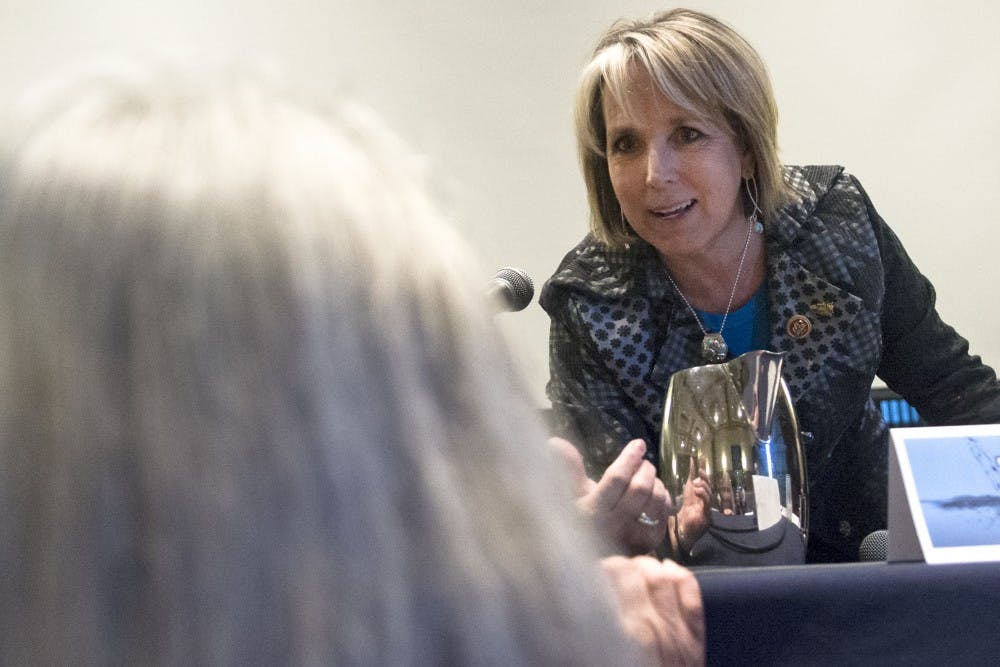The Water Innovation Summit was hosted by U.S. Rep. Michelle Lujan Grisham, D-N.M., with the goal of bringing together people from every side of the water conservation issue to discuss new technologies, innovations and policy changes that could be used to continue meeting the state’s water needs.
Panels of experts discussed the current state of New Mexico’s water resources, technological solutions to water scarcity like water reuse and brackish and desalinated water, innovative water management and policy changes, and economic development opportunities.
“In being elected to Congress, you want to identify what the key priorities are for your district and state, and given the drought and our water issues it’s easy to see that water is a major issue,” Grisham said. “There’s now a handful or more of large municipalities in this country who don’t have safe drinking water. So there’s lots of work to do, and (the summit) was really a collaboration of partners. And without figuring out water issues, you can’t do any economic work — not successfully or sustainably.”
Grisham, the congresswoman from the state’s First Congressional District, said there is a dire need to tackle the issue from every angle, and for that to happen there needs to be constructive dialogue between groups that have very different water needs and priorities, like manufacturing and conservationists.
The ultimate goal of summits like these, and the goal for the entire state, is to find the delicate balance between creating job growth in industries like manufacturing and natural gas, and conserving and protecting the limited water resources of the state, she said.
To do this, industry must implement as many technological innovations they can, and government needs to make policy changes that support those changes and manage and protect water reserves as much as possible.
“We should keep investing in technology. I never want innovation to be, pardon the pun, stagnant. However, you do need productive policy,” Grisham said. “If you can’t implement that technology, if you can’t get your government jurisdictions to really be serious about utilizing new ideas and new technology, you can’t move forward.”
Adam Ringia, environmental and natural resources director for the Laguna pueblo, said summits like this one are extremely valuable in helping to open discussions about the conflicts of interest that plague the water issue in New Mexico.
Ringia said the pueblo has been battling in court about its water rights for 30 years. The pueblo is sovereign territory, but it is downstream from other users who the pueblo has no control over. To put it simply, he said, it’s complicated.
“I think (these summits) are very constructive, but you need all the stakeholders at the table so you can understand everybody’s water culture and everybody’s water needs and what they see in the future,” Ringia said. “Then you can start to really have a dialogue as to how we’re going to move forward, what we need to do to plan and manage the resource.”
Sandia National Labs ecologist Howard Passell, who also teaches at UNM’s water resources program, spoke at the summit about transformational solutions for water management and policy in New Mexico.
Get content from The Daily Lobo delivered to your inbox
He argued that even with the entire state using less water and accessing more, the current water situation is not sustainable.
“If we continue down the path that we’re on now, with all of the incremental solutions we’re pursuing, we aren’t going to be able to meet demand in the future. So we’re trying to identify the transformational solutions that could be adopted,” Passell said.
He agreed that the situation is extremely complicated, and that each proposed solution comes with its own set of problems. But he said he felt that the public is more aware than ever of the importance of the issue, and that politicians just need the will to make tough political and economic decisions.
“The technology exists, it’s just a matter of how do we get it implemented at the scale it’s required to make the big changes that are needed,” he said.
Grisham acknowledged that every decision about water in New Mexico is tough. Supporting natural gas drilling to help create jobs comes along with dangerous practices like “fracking” that have the potential to destroy aquifers. But Grisham said she feels confident that by investing in new technologies and encouraging dialogue between industry, lawmakers and conservationists, the state can find a balance that works for everyone.
“It is really about the economy. How are we preserving, conserving and innovating in water that gives us the greatest protection to our citizens and the greatest economic opportunity? And not allowing those things to be mutually exclusive, which too often they have been,” Grisham said. “That’s exactly our goal — find the balances.”
Jonathan Baca is the news editor at the Daily Lobo. He can be contacted at news@dailylobo.com , or on Twitter @JonGabrielB.






